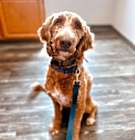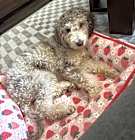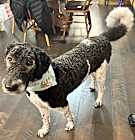Sheepadoodle puppies can grow up to weigh between 30 and 80 pounds. How big a full-grown Sheepadoodle gets depends on the parents of the puppy. The Standard Sheepadoodle is the most common size, weighing 55 to 80 pounds and standing around 19 to 24 inches in height. Breeding an Old English Sheepdog with a smaller Standard Poodle results in a Medium Sheepadoodle, which weighs 40 to 55 pounds. Crossing a Miniature Poodle and an Old English Sheepdog results in a Mini Sheepadoodle, the smallest of the Sheepadoodle crosses, weighing in at less than 40 pounds and standing around 15 inches in height.
Shepadoodle
Breed Type: Crossbreed
Coat: Wavy, smooth
Hypoallergenic: Yes, they may not trigger allergies.
Temperament: Loyal, intelligent, protective, friendly
Life expectancy: 10-14 years
Color & patterns: Chocolate

Meet the Shepadoodle, where working German Shepherd resilience meets Poodle smarts. This crossbreed blends the looks and brains of both parent breeds, promising a curly-haired and intelligent pup. If you’re considering adopting a dog, this mix might have everything you’re looking for.
Shepadoodle characteristics
Learn about about Shepadoodle basics like their fur colors, shedding levels, how much grooming they need, and other Shepadoodle facts.
Average height
18-28 inches (45.7-71.1cm)
Average weight
50-90 pounds (22.7-40.8 kg)
Average lifespan
10-14 years
Exercise needs
Grooming needs
Full-grown size
Good with cats
Good with kids
Training aptitude
Do Shepadoodles shed?
Yes, Shepadoodles can shed. But it’s very minimal thanks to their Poodle-esque hypoallergenic coat. (The extent of shedding can vary by the individual dog, with some shedding more than others.) Shepadoodles with curlier coats tend to shed less than those with straighter coats. Regular grooming, including brushing a few times a week, can help minimize shedding by removing loose hair.
What colors do Shepadoodles come in?
Shepadoodles come in black, white, brown, cream, apricot, sable, and various shades of gray. Additionally, Shepadoodles may have markings or patterns such as brindle, parti-color, or phantom (where two different colors appear on the coat). The specific coloration of a Shepadoodle can vary widely due to genetics and inherited traits.
How big do Shepadoodles get?
Shepadoodles weigh between 50 to 90 pounds and stand around 18 to 28 inches tall at the shoulder. There is variation within the breed: Some can lean more towards the smaller end of the spectrum, and others towards the larger end.
What does a Shepadoodle look like?
Shepadoodles look like a cross between a German Shepherd and a Poodle. They are medium to large in size and have an athletic physique. Their coats can range from wavy to curly, and may come in various colors such as black, white, brown, or a combination of these colors. Shepadoodles often have expressive eyes and a friendly facial expression. Their ears may be floppy or erect, depending on genetics.
How long do Shepadoodles live?
Shepadoodles live between 10 and 14 years, though individual longevity can vary based on factors such as genetics, diet, exercise, and overall health. With proper nutrition, regular veterinary check-ups, exercise, and a loving environment, Shepadoodles can enjoy a relatively long and healthy life.
What is a Shepadoodle?
A Shepadoodle, also known as a Germandoodle, is a designer dog that comes from crossbreeding a German Shepherd and a Poodle. These dogs inherit traits from both parent breeds, combining the intelligence, loyalty, and protective instincts of the German Shepherd with the hypoallergenic coat and playful nature of the Poodle. Shepadoodles are known for their versatility, making them suitable for various roles, including family pets, therapy dogs, service animals, and working dogs.
Are there different types of Shepadoodles?
Yes, there are different types of Shepadoodles. The variations depend on factors such as the size of the Poodle parent (standard, miniature, or toy), the generation of the crossbreeding (F1, F1b, etc.), and the specific traits desired by breeders and pet parents. Common variations include Standard Shepadoodles, Miniature Shepadoodles, and Toy Shepadoodles — each of which differs in size and sometimes temperament. Additionally, Shepadoodles vary in coat color, texture, and pattern, reflecting the diversity of German Shepherds and Poodles. There may not be officially recognized “types” of Shepadoodles, but they certainly appeal to people with different preferences and lifestyles.
What is an F1 Shepadoodle?
An F1 Shepadoodle is a first-generation crossbreed resulting from the mating of a purebred German Shepherd with a purebred Poodle. The “F1” designation indicates that it is the first-generation offspring of these two distinct breeds. F1 Shepadoodles inherit a blend of traits from both parent breeds, including intelligence, loyalty, and a hypoallergenic coat. They may vary in appearance and temperament, but they often exhibit qualities appreciated by both German Shepherd and Poodle enthusiasts.
When do Shepadoodles stop growing?
Shepadoodles stop growing between 12 and 18 months of age, although some may continue to fill out and develop muscle tone for several months afterward. The exact timing of when a Shepadoodle stops growing can vary depending on factors such as genetics, diet, and overall health.
Shepadoodle health
Learn about about the Shepadoodle health outlook and what diseases they may be prone to at various stages of their life.
Are Shepadoodles hypoallergenic?
Yes, Shepadoodles are considered hypoallergenic thanks to their Poodle half, which gives them a hypoallergenic coat that sheds less. However, no dog breed is entirely hypoallergenic. Individuals with serious allergies may still react to proteins found in a dog’s saliva, dander, or urine, regardless of the breed. Shepadoodles tend to produce fewer allergens than some other breeds, making them more suitable for allergy sufferers. Regular grooming, including brushing and bathing, can help reduce allergens further and make living with a Shepadoodle more comfortable for individuals with allergies.
Do Shepadoodles have health issues?
Yes, there are some health issues that Shepadoodles are more prone to developing. They include:
Hip dysplasia: Hip dysplasia is a hereditary condition where the hip joint doesn’t fit properly, leading to pain, lameness, and arthritis. It’s common in large breeds like German Shepherds and can affect Shepadoodles, especially if not screened and managed appropriately.
Progressive retinal atrophy (PRA): PRA is a group of degenerative eye disorders that can lead to vision loss and blindness. It’s an inherited condition that affects both German Shepherds and Poodles, so Shepadoodles may be at risk if not screened regularly.
Gastric dilatation-volvulus (GDV): Also known as bloat, GDV is a life-threatening condition where the stomach twists and traps gas, leading to bloating and potentially cutting off blood supply. Large and deep-chested breeds like German Shepherds are more prone to GDV, so Shepadoodles may be at risk, especially if they eat quickly or exercise after meals.
Epilepsy: Epilepsy is a neurological disorder characterized by recurrent seizures. While the exact cause is usually unknown, it can be carried genetically in both German Shepherds and Poodles, potentially affecting Shepadoodles as well. Seizures can vary in frequency and severity, requiring lifelong management with medication and veterinary care.
Do Shepadoodles need grooming?
Yes, Shepadoodles need grooming to maintain their coat health, prevent matting, and smooth out tangles. The extent of grooming depends on the specific coat type they inherit from their Poodle parent, which can vary from wavy to curly. Most Shepadoodles need brushing several times a week to remove loose hair. Some pet parents opt for professional grooming every few months to keep their Shepadoodles’ coats trimmed and neat, while others prefer to groom their Shepadoodle at home. These dogs should also have their teeth brushed, nails trimmed, and ears cleaned regularly.
Shepadoodle history
Learn about where this Shepadoodle came from!
What were Shepadoodles bred for?
Shepadoodles were bred for intelligence, loyalty, hypoallergenic coats, and friendly demeanors. Their German Shepherd heritage accounts for their protective instincts, trainability, and loyalty, while their Poodle lineage is responsible for their intelligence, hypoallergenic coats, and playful nature. Shepadoodles are suitable companions for a wide range of lifestyles and activities.
Where do Shepadoodles come from?
Shepadoodles most likely come from the United States, although their exact origins are not as well-documented as purebred breeds. As a designer dog, Shepadoodles have gained popularity in recent years as people seek dogs that combine the best traits — intelligence, energy, loyalty — of their parent breeds, the German Shepherd and the Poodle.
Shepadoodle temperament
Learn about about the Shepadoodle temperament and how well they fit into your lifestyle, home environment, and family.
Are Shepadoodles good with kids?
Yes, Shepadoodles are good with kids, especially when they are raised together and have been properly socialized from a young age. These dogs often have friendly and affectionate personalities, making them well-suited to interact with children.
Regardless, it’s important to supervise interactions between Shepadoodles and kids, especially younger ones, to ensure safety. Teaching children how to properly approach and handle dogs is crucial to ensure positive experiences for both the dog and the child, as is teaching dogs how to interact gently with children.
Are Shepadoodles good family dogs?
Yes, Shepadoodles are good family dogs. Shepadoodles are often described as gentle and patient with children. However, with any dog breed, supervision is important to ensure positive interactions, and teaching children how to properly approach and handle dogs is crucial to ensure positive experiences for both the dog and the child — as is teaching dogs how to interact gently with children. Early socialization and positive reinforcement training can help Shepadoodles develop good manners and behaviors around family members and other pets.
Are Shepadoodles easy to train?
Yes, Shepadoodles are easy to train. They are highly intelligent, eager to please, and have a strong desire for companionship. Their German Shepherd ancestry comes with traits such as loyalty and attentiveness, while their Poodle lineage adds more intelligence and trainability. So, they often excel in obedience training and can quickly learn new commands and tasks. Positive reinforcement, consistency, and patience are key when training Shepadoodles, as they respond well to treats, praise, and playtime.
Don’t be fooled by the “easy to train” label, though. Training dogs takes time (think months and years, not days) — it isn’t instant, regardless of breed.
Are German Shepherds and Poodles a good mix?
Yes, a German Shepherd and a Poodle mix well. The German Shepherd half accounts for their loyalty, intelligence, and protective instincts, while the Poodle half offers a hypoallergenic coat, smarts, and a playful nature. Shepadoodles often inherit a blend of these traits, making them adaptable and suitable for pet parents with different lifestyles.
Are Shepadoodles friendly?
Yes, Shepadoodles are friendly. They often form strong bonds with their pet parents. They are not just loyal and intelligent but also eager to please, making them good pets for families or individuals seeking a canine companion. As with any dog breed, individual temperament can vary, so early socialization and positive training can help Shepadoodles grow into well-behaved and sociable dogs.
Do Shepadoodles bark a lot?
No, Shepadoodles do not bark a lot. Still, their barking behavior can depend on factors such as genetics, socialization, training, and environment. In particular, proper training and socialization from a young age can help minimize excessive barking in Shepadoodles. Meanwhile, providing mental and physical stimulation can likewise keep them content and less likely to bark out of boredom or anxiety.
Are Shepadoodles good with cats?
Yes, Shepadoodles can be good with cats if they are socialized with them from a young age. Without that socialization, these dogs may have a higher prey drive or not be as tolerant of cats, which could lead to conflicts or challenges. Proper introductions and gradual acclimation can improve the chances of a positive canine-feline relationship.
Are Shepadoodles good with other dogs?
Yes, Shepadoodles can also be good with other dogs when properly socialized with dogs from a young age and in a positive manner. Their friendly nature often allows them to interact and play well with other canines. Of course, individual personalities can vary, and some Shepadoodles may be more dominant or assertive than others, which could lead to conflicts with other dogs. So, pet parents should supervise introductions and socialization with other dogs to ensure they get along.
Are Shepadoodles smart?
Yes, Shepadoodles are smart. They inherit intelligence from their parent breeds, the German Shepherd and the Poodle, both of which are known for their smarts. Shepadoodles often demonstrate problem-solving abilities, quick learning, and adaptability to various tasks and environments. Their intelligence, combined with their eagerness to please, makes them relatively easy to train and capable of excelling in obedience and agility activities.
Do Shepadoodles like to cuddle?
Yes, Shepadoodles like to cuddle. They are known for their affectionate nature, and they form strong bonds with their family members. Shepadoodles often seek out physical contact and closeness with their human companions, whether that means sitting beside them on the couch, snuggling up in bed, or simply leaning against them for comfort.
Are Shepadoodles protective?
Yes, Shepadoodles can be protective of their families and territory. They inherit protective instincts from their German Shepherd side, known for loyalty and guarding abilities. Shepadoodles are often attentive to their surroundings and may alert pet parents to potential threats or unfamiliar situations. However, their protective behavior is balanced with their sociable nature, making them more inclined to warn rather than act aggressively.
Are Shepadoodles good service dogs?
Yes, Shepadoodles are good service dogs because they are intelligent, trainable, and versatile. In fact, both their parent breeds, the German Shepherd and the Poodle, are commonly used as service animals. Shepadoodles often excel in tasks such as mobility assistance, guide work for the visually impaired, medical alerts, therapy work, and emotional support. Their hypoallergenic coat and friendly demeanor make them well-suited for working in various environments and interacting with people of all ages.
Find Shepadoodle puppies near you
Adopting a Shepadoodle
We don't see any Shepadoodles available for adoption in your exact location or cities near you, but here are some adorable similar breeds in Columbus, OH.

Hampton
Labradoodle Goldendoodle
Male, young
Reynoldsburg, OH
Good with dogs
Not good with cats
House-trained
Spayed or Neutered
Shots are up-to-date

Milo
Labradoodle
Male, adult
Columbus, OH
Good with dogs
Not good with cats
House-trained
Spayed or Neutered
Shots are up-to-date

Toby
Labradoodle
Male, puppy
Columbus, OH
Not good with dogs
Not good with cats
House-trained
Shots are up-to-date

Liesel
Labradoodle
Female, 8 yrs 6 mos
Plain City, OH
Not good with dogs
Not good with cats
Needs experienced adopter
House-trained
Spayed or Neutered
Shots are up-to-date

Marley
Poodle (Standard) Mastiff
Female, young
South Bloomfield, OH
Good with dogs
Not good with cats
House-trained
Spayed or Neutered
Shots are up-to-date

Hampton
Labradoodle Goldendoodle
Male, young
Reynoldsburg, OH
Good with dogs
Not good with cats
House-trained
Spayed or Neutered
Shots are up-to-date

Milo
Labradoodle
Male, adult
Columbus, OH
Good with dogs
Not good with cats
House-trained
Spayed or Neutered
Shots are up-to-date

Toby
Labradoodle
Male, puppy
Columbus, OH
Not good with dogs
Not good with cats
House-trained
Shots are up-to-date

Liesel
Labradoodle
Female, 8 yrs 6 mos
Plain City, OH
Not good with dogs
Not good with cats
Needs experienced adopter
House-trained
Spayed or Neutered
Shots are up-to-date

Marley
Poodle (Standard) Mastiff
Female, young
South Bloomfield, OH
Good with dogs
Not good with cats
House-trained
Spayed or Neutered
Shots are up-to-date


